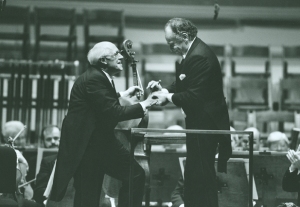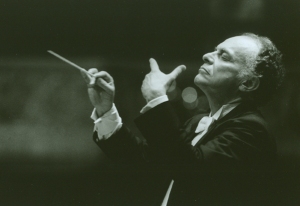You are currently browsing the tag archive for the ‘Mstislav Rostropovich’ tag.
____________________________________________________
On May 27, 1999, Mstislav Rostropovich and the Chicago Symphony Orchestra launched a three-week festival celebrating the music of Dmitri Shostakovich with a concert that included the First Symphony along with arias and interludes from Lady Macbeth of Mtsensk with soprano Olga Guriakowa.
Interviewed for the Orchestra’s program book, Rostropovich commented, “Shostakovich’s world is our world. For many decades my own life was inextricably part of that world, and has continued to be so, even now. To have lived at the same time as Shostakovich is a source of great joy. To have been invited in his creative life has been an immense responsibility. And to play his music has been the greatest happiness.”
Over the course of the festival, Rostropovich conducted four more of the composer’s symphonies: nos. 10, 11, 12, and 13 with bass Sergei Aleksashkin and men of the Chicago Symphony Chorus. He also included a suite from the incidental music to the film Hamlet, the First Piano Concerto with Constantin Lifschitz and principal trumpet Adolph Herseth, and the Violin Concerto with Maxim Vengerov. In addition, Rostropovich conducted the composer’s arrangement of Schumann’s Cello Concerto with Enrico Dindo and Mussorgsky’s Songs and Dances of Death with contralto Larissa Diadkova. Finally, he performed as soloist in the First Cello Concerto—a work written especially for him—led by associate conductor William Eddins.
Rostropovich first appeared as soloist with the Orchestra on December 9, 10, and 11, 1965, in Dvořák’s Cello Concerto with Georg Solti—in his Orchestra Hall debut—conducting. He first appeared as conductor with the Orchestra at the Ravinia Festival on August 14, 1975, leading Tchaikovsky’s Francesca da Rimini; arias from Puccini’s operas with his wife, soprano Galina Vishnevskaya; and Prokofiev’s Fifth Symphony. Rostropovich first conducted at Orchestra Hall on the Orchestra’s gala centennial concert on October 6, 1990, leading the last movement of Brahms’s First Piano Concerto with András Schiff as soloist.
This article also appears here.
The Chicago Symphony Orchestra family joins the music world in mourning the loss of Lorin Maazel, a frequent and beloved guest conductor for forty years, from 1973 until 2013. Maazel died on July 13, 2014, at his Castleton Farms estate in Virginia. He was 84.
Maazel made his debut with the Chicago Symphony Orchestra in February and March 1973, leading two weeks of subscription concerts at Orchestra Hall as well as a run-out to Milwaukee:
February 22, 23 & 24, 1973
February 26, 1973 (Pabst Theater in Milwaukee, Wisconsin)
SIBELIUS Symphony No. 2 in D Major, Op. 43
BARTÓK Two Images, Op. 10
SCRIABIN The Poem of Ecstasy, Op. 54
March 1, 2 & 3, 1973
MARTIRANO Contrasts for Orchestra
RACHMANINOV Piano Concerto No. 3 in D Minor, Op. 30
Vladimir Ashkenazy, piano
SCHUMANN Symphony No. 2 in C Major, Op. 61

Mstislav Rostropovich and Lorin Maazel, following their performance of the first movement of Dvořák’s Cello Concerto at the Centennial Gala on October 6, 1990
During his forty-year collaboration with the Orchestra, Maazel’s repertoire covered a wide range of composers, including Beethoven, Brahms, Hindemith, Holst, Kernis, Mahler, Mendelssohn, Mozart, Penderecki, Prokofiev, Respighi, Strauss, Stravinsky, Tchaikovsky, Verdi, and Wagner. He was one of several conductors invited to share the podium for the CSO’s Centennial Gala on October 6, 1990, and a few weeks later he led the Orchestra in the world premiere of Shchedrin’s Old Russian Circus Music (commissioned to celebrate the CSO’s centennial season) on October 25, 1990. A noted composer, Maazel also led the Orchestra in the U.S. premiere of his own Farewells on December 14, 2000.
Maazel last led the Chicago Symphony Orchestra at Orchestra Hall for two weeks of subscription concerts—including a run-out to the Krannert Center at the University of Illinois—in February 2005:
February 10 & 12, 2005
February 11, 2005 (Krannert Center for the Performing Arts at the University of Illinois at Urbana-Champaign, Urbana, Illinois)
BRAHMS Serenade No. 2 in A Major, Op. 16
BARTÓK Two Images, Op. 10
PROKOFIEV Symphony No. 5 in B-flat Major, Op. 100
February 17, 18, 19 & 20, 2005
THOMAS Gathering Paradise
Heidi Grant Murphy, soprano
SHOSTAKOVICH Cello Concerto No. 1
John Sharp, cello
SIBELIUS Symphony No. 1 in E Minor, Op. 39
His most recent appearance in Orchestra Hall was in March 2009 with the New York Philharmonic, during his final season as that ensemble’s music director:
March 9, 2009
BERLIOZ Roman Carnival Overture, Op. 9
TCHAIKOVSKY Suite No. 3 in G Major, Op. 55
STRAVINSKY The Rite of Spring
Maazel’s last appearances with the Chicago Symphony Orchestra were tour concerts in January and February 2013, including stops in Hong Kong, Shanghai, Beijing, Tianjin, and Seoul.
A statement from the Chicago Symphony Orchestra on Lorin Maazel’s passing can be found here.
____________________________________________________
Sir Georg Solti introduced a number of up-and-coming artists to Chicago audiences, including seventeen-year-old Anne-Sophie Mutter in October 1980. She was a replacement for the originally scheduled Leonid Kogan.
According to her biography in the program book, Mutter had made her U.S. debut with Zubin Mehta and the New York Philharmonic in January 1980, performing Mendelssohn’s Violin Concerto. Two weeks later, she appeared with the National Symphony Orchestra in Mozart’s Third Violin Concerto with Mstislav Rostropovich conducting.

For her Chicago Symphony Orchestra debut, Mutter performed Beethoven’s Romance in G major and Mozart’s Third Violin Concerto. Reviews of the performances, concentrating primarily on Sir Georg’s account of Bruckner’s Fourth Symphony, are here, here, here, and here.
Mutter appeared twice more with the CSO under Solti’s baton: on January 12 (special University Night concert), 13, 14, and 15, 1983, in Mozart’s Fourth Violin Concerto; and on May 11, 12, and 13, 1989, in Beethoven’s Violin Concerto.

I couldn’t resist expanding on today’s On This Day factoid: “December 9, 1965 – Georg Solti makes his Orchestra Hall debut with the Orchestra, conducting Bartók’s Dance Suite, Dvořák’s Cello Concerto (with Mstislav Rostropovich), and Schubert’s Ninth Symphony.”
Solti had appeared with the Orchestra at the Ravinia Festival on several occasions in the 1950s and also had conducted at Lyric Opera in 1956 and 1957. But this was his debut at Orchestra Hall.
And Rostropovich had appeared in Chicago at Orchestra Hall as a recitalist, but this was his first appearance with the Orchestra.
 According to Roger Dettmer’s review in Chicago’s American on December 10, Solti’s conducting “was too relentlessly intense, and yet a valid expression because of [his] undeviating vision, and the astoundingly subtle response he won from our orchestra. . . . Welcome back, Maestro Solti. Would that we might be able to say, ‘Welcome home.’”
According to Roger Dettmer’s review in Chicago’s American on December 10, Solti’s conducting “was too relentlessly intense, and yet a valid expression because of [his] undeviating vision, and the astoundingly subtle response he won from our orchestra. . . . Welcome back, Maestro Solti. Would that we might be able to say, ‘Welcome home.’”
In the Chicago Tribune, Thomas Willis wrote that the performance of the Dvořák was not to be forgotten: “The Rostropovich attack begins with a swashbuckling preparatory flourish, yet sends the first microsecond precisely where it belongs. This one was intended for the back wall. Later came the variety show—fortissimo and pianissimo, or so you thought until he topped it next time out, all manner of rubato within phrases, heart on sleeve ritards, jutting jaw bravura. . . . For an ending, he laid the final descending phrase exactly when and where it belonged to light the slow fuse.”
 Rostropovich responded to the prolonged standing ovation with Bach’s E minor sarabande, “restrained, patrician in its utter authority and command of color and tempo, and absolutely right.”
Rostropovich responded to the prolonged standing ovation with Bach’s E minor sarabande, “restrained, patrician in its utter authority and command of color and tempo, and absolutely right.”










